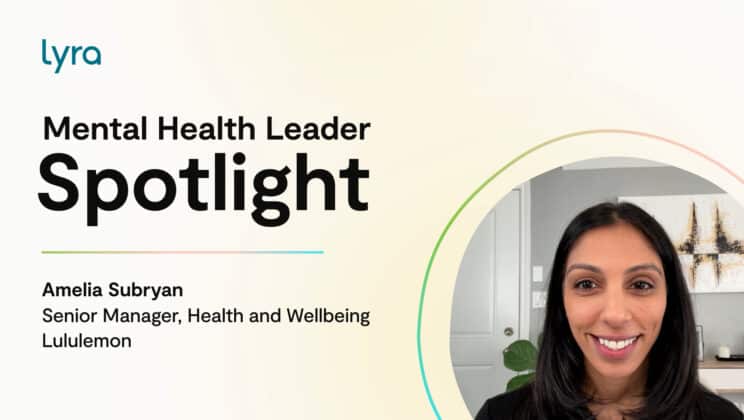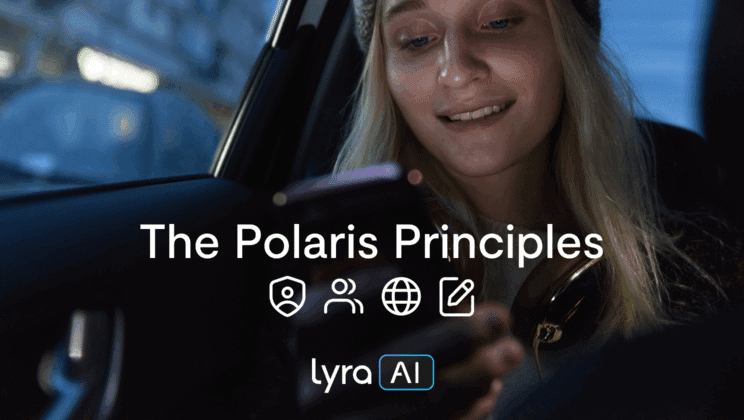Introducing Lyra AI: Clinically rigorous mental health AI with a human touch
October 14, 2025
People are increasingly turning to general-purpose artificial intelligence (AI) assistants for mental health support, even as the companies behind them warn that these tools carry risks and are not a replacement for professional care.
These tools are free, instant, and can feel like someone is listening. In those moments of distress, that convenience can be enough to pull someone in.
But these systems aren’t always built or overseen by clinicians. They’re trained to predict words, not recognize warning signs or keep people safe. That makes them both appealing and risky when someone is at their most vulnerable.
Simply put, AI outside of clinical care can’t deliver safe, effective mental health support. That’s why we need clinically rigorous AI, built for how people actually seek help today, with clinicians and safeguards at the center.
Lyra was founded on the idea of making mental health care better through technology with a human touch. We pioneered AI to match members with the right providers, and the Lyra Care model, where providers engage their clients in-between live sessions with “Guided Practice Sessions” to build mental health skills through tailored interactive videos and exercises. Lyra’s approach to fusing evidence-based human care with technology has been proven in peer-reviewed studies to reduce the cost of care by 20% and double the number of people with lasting symptom improvement.
Because life happens between sessions: introducing Lyra AI
Lyra AI is here to help more people start care and see faster, more lasting symptom improvement, all at lower costs. Lyra AI is supercharging the Lyra Care model with 24/7 in-the-moment support fully integrated with human care and crisis support, and guided by our same clinical standards and commitment to quality.
Lyra AI provides a lower-barrier entry point to help give people the confidence to start their care journey. It’s a safe, confidential, and approachable way to explore mental health support, creating an easy onramp to getting real help.
Once in care, Lyra AI is your support guide between sessions, and long after you stop seeing your provider to help keep you well. Lyra AI helps you apply the mental health skills you learn with your human provider to your everyday life, helping you feel better, faster. When intrusive thoughts bother you at night, or you need help staying calm and focused before an important work call, Lyra AI is here for you, instantly.

For members facing mild to moderate challenges like burnout, sleep, and stress, Lyra AI stays with you throughout care with instant access to clinically vetted, integrated support through evidence-based, clinically-designed conversational AI. Lyra AI features a sophisticated flagging system that identifies situations requiring immediate escalation and live human provider monitoring, as well as clear escalation pathways to quickly connect a member with a live representative from Lyra’s 24/7 care team.
Lyra AI is currently available through a pilot for select customers in the U.S. enrolled in Lyra Coaching, with plans to expand across Lyra’s 24/7 digital care experience in 2026.
A principled approach to GenAI
Introducing AI into mental health care requires more than technology; it requires safeguards. Every tool we create is built in close coordination with our clinical team, and guided by our Polaris Principles, a set of strategic and clinical commitments that ensure AI is used responsibly in support of real people:
- Safety and ethics are paramount: anchored in standards from both clinical care and AI to ensure responsible use.
- Human providers are critical: purpose-built to enhance and complement clinicians to drive better outcomes, accountability, and engagement.
- Culturally responsive care is key to global reach: designed to reflect diverse needs and connect people with relevant care wherever they are.
- Innovation driven by science: tested against clinical standards, backed by data, and continuously refined through research.
These principles are the foundation behind Lyra AI and guide how we build, test, and implement AI across Lyra’s care experience.
A safe and seamless path forward
The fact that so many people are turning to AI as their first stop for mental health support isn’t a sign that care has failed. It’s a sign that care must continue to evolve. By integrating AI tools directly into a proven, clinically-backed model, we can bridge the gap between instant accessibility and genuine safety, while also delivering care that works.
The future of mental health care isn’t about choosing between humans and AI. It’s about combining the best of both — immediate and responsive technology paired with human expertise and empathy. That’s how we ensure that no matter where someone is in their journey, they have access to the right kind of care.
Author
Jenny Gonsalves
Chief Product and Technology Officer
Jenny leads technology and innovation at Lyra. An early leader in AI in mental health care, she excels at using technology to build highly scalable and innovative products in close partnership with clinical teams. Prior to Lyra, Jenny spent over 16 years building large-scale CRM platforms. She holds a CS degree from the University of Toronto and has been recognized globally among the Top Women in HealthTech and on Girl Geek X’s list of Female CTOs to Watch multiple years in a row.
Explore additional blogs

Mental health at work
Mental Health Leader Spotlight: Carey Shore, Wellness Program Manager, Heidelberg Materials

Mental health at work
Mental Health Leader Spotlight: Amelia Subryan, Senior Manager, Health and Wellbeing at lululemon

Lyra news